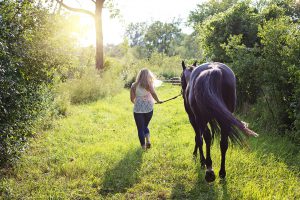Arthritis
Arthritis
 Arthritis is unfortunately very common in horses, especially in the ageing horse population. It is a degenerative joint disease that causes pain and inflammation. Over time, the inflammation damages the cartilage within a joint beyond repair, leading to chronic pain. Cartilage is the ‘cushioning’ within a joint which allows it to run smoothly. Arthritis is unfortunately not curable and instead must be managed for the rest of a horse’s life.
Arthritis is unfortunately very common in horses, especially in the ageing horse population. It is a degenerative joint disease that causes pain and inflammation. Over time, the inflammation damages the cartilage within a joint beyond repair, leading to chronic pain. Cartilage is the ‘cushioning’ within a joint which allows it to run smoothly. Arthritis is unfortunately not curable and instead must be managed for the rest of a horse’s life.
Arthritis is one of the most common causes of retirement amongst horses, so early diagnosis and management is really important. Most commonly, a horse will show signs of lameness or mild stiffness initially. This may be a lameness that improves with exercise, or the horse ‘warms out’ of it. There may also be associated swelling or heat around an affected joint.
How is arthritis diagnosed?
Your vet will watch your horse move on a hard and a soft surface, as well as doing some flexion tests to locate the problem initially. Flexion tests put extra stress through certain joints, and so will make pain in a joint more obvious to the clinician. Following this, your vet may perform joint blocks to localise the problem further or may progress straight to taking some radiographs (x-rays). Depending on the affected joint, there will be some ‘classic’ signs of arthritis on x-ray. This is the best way to definitively diagnose osteoarthritis, when the arthritic changes have progressed to a point where boney changes are present.
Managing arthritis in your horse
Unfortunately, there is very little evidence to suggest that arthritis can be prevented, due to its slow, degenerative nature, but it is possible to manage the associated pain. From an owner’s perspective, there are a number of things you can do to help. Firstly, managing a horse’s weight is really important! Overweight horses carry extra kilos around with them which adds stress and strain to their joints. Depending on the location and severity of the problem, regular gentle exercise can be really beneficial.
It’s possible that the type of exercise your horse does may need to change following a diagnosis of arthritis, but if the horse is comfortable enough to do gentle hacking then keeping a base level of fitness can be sensible. It is always best to discuss your horse’s exercise plan with a vet to tailor it to you and your horse. If the horse is too lame to be ridden, then regular turnout may be the best way to facilitate gentle movement. Arthritic horses can become increasingly stiff and sore when stood in a stable for extended periods of time.
Medication for arthritis
As well as management, there are other things your vet may suggest for management of arthritis. Firstly, joint supplements may be beneficial for maintaining horses with arthritis. Always speak to your vet about the best joint supplement for your horse. Secondly, oral anti-inflammatory drugs can make a big difference. The most common drug used is phenylbutazone (bute) but there are others if bute does not agree with your horse, or he refuses to eat it. These drugs help by reducing the pain associated with arthritis, and so allowing them to move more freely. Although we try to reduce long term use of anti-inflammatories when possible, in certain cases it is necessary to keep a horse comfortable in their older years.
There are also more invasive techniques for management of joint disease. The most common of these is directly injecting the joint with medication. Steroids are often used, as they are a potent anti-inflammatory drug. There are also joint medications which aim to aid the remaining cartilage. A more recent development is the use of bisphosphonates, which are injectable and aim to reduce bone resorption. These should only be used in specific cases of arthritis, as recommended by your vet.
Finally, a diagnosis of arthritis is not necessarily the end of the road for a horse’s ridden career. With good management and medical intervention, some patients will be able to enjoy life for years to come.
If you have any questions on the diagnosis or management of arthritis, please contact your local Horse Health Programme vet for further information >





